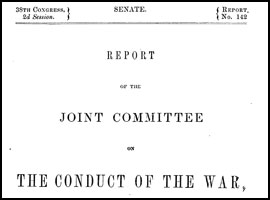While working on my own research project over the summer of 2022 I read Congress at War by Fergus Bordewich, a book that Bryan previously reviewed here in January 2021. I agree with Bryan’s take on the book wholeheartedly; it is a must read for any Civil War history enthusiast and its strengths definitively lie in the way that it deals with Congress’s financing of the American Civil War, a topic considerably neglected in many other narrative histories of the war. For my part, this book would make the syllabus of any class I taught about the Civil War itself, or even be the book to read about the Civil War as it broadens the scope of analysis about the Union government from the actions of one man and his advisors (Lincoln & the Cabinet) to the larger apparatus of the Federal government.
However, there is a larger implication that Bordewich presents Civil War historians through Congress at War: the need to reread and reevaluate the reports of the Joint Committee on the Conduct of the War. The Joint Committee on the Conduct of the War was the bicameral Congressional committee chaired by Sen. Benjamin Wade of Ohio which interrogated Lincoln, the War Department, and key Union generals about the failure of Union arms during the war’s first three years. In other histories of the Civil War, such as Shelby Foote’s three volume behemoth, James McPherson’s Battle Cry of Freedom, or even Dorris Kearns Goodwin’s biographical Team of Rivals, the Joint Committee is often sidelined in the narrative to focus on Lincoln’s actions or analyzed as a purely partisan political entity that impeded Lincoln’s war strategy. Based on Bordewich’s analysis, however, this is an unfair appraisal of the committee’s work. Instead, Bordewich implicitly demonstrates how the Joint Committee was the lawful and constitutional use of Congress’s power to investigate the Executive Branch and provide civilian oversight of the U.S. Military.
Now, I am not asserting here that the Joint Committee was apolitical or didn’t suffer from factionalism; the generals it investigated did tend to be conservative Old Army Democrats. However, its questions and investigations were born of legitimate concerns about the Union Army’s efforts in the field, especially after the disaster at First Bull Run, McClellan’s dilatory efforts to engage Confederate forces in Virginia and precipitous retreat from Richmond during the Peninsula Campaign, and then Burnside’s devastating defeat at Fredericksburg following McClellan and Pope’s lackluster performances at the Second Bull Run and Antietam, respectively. Taken together, it is not inconceivable that Republicans in Congress believed that the army’s officer corps was tepidly prosecuting the war or even undermining the war effort due to pro-Southern or anti-Republican and anti-emancipation political leanings–which were well documented in the Army of the Potomac. These political realities, and the accurate notion Congressional leaders had that repeated failure on the battlefield meant the failure of the Union War effort, merits a closer and renewed examination of the Joint Committee’s reports. Why did the Joint Committee investigate whom they did? Did those generals merit such an investigation? If so, why? Were the Joint Committee’s suspicions plausible? Why have they been interpreted as merely obstructionist and political? How did the Joint Committee try to establish and create Union war policy? Did Lincoln change his own policies and orders as a political move to head-off Congressional criticism or investigations into his own leadership? These are just some of the questions that reading the Joint Committee’s reports can start to answer.
Lastly, relitigating and reframing Union leadership during the Civil War around Congress also has an added civic benefit today. While history does not repeat itself, there is a pattern in American history of Presidents stretching the limits of their powers during wartime to either conduct the war itself, squash dissent, or some combination of the two. In our own 21st-century context, presidents of both political parties have essentially waged war and conducted military operations with little more than a blank check or mild rebuke from Congress. Evaluating the role that Congress actually plays in a time of war, and how it can or ought to use its own constitutional powers to check an “imperial” presidency, will only further inform how an appropriate balance of power can be maintained between the branches of government. It also arms us, as citizens, with the appropriate context and information we need to determine when Congressional oversight is purely a partisan attack job from the opposition versus a warranted use of Congressional authority to prevent the abuse of power. While the Joint Committee on the Conduct of the War has often been interpreted as the former, Bordewich’s work makes the case in his own analysis of Congress’s role in the war that, political though it was, the committee was not on a partisan mission to win the next election but the existential one to save the Union from destruction.
